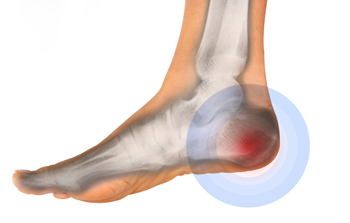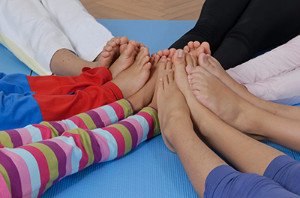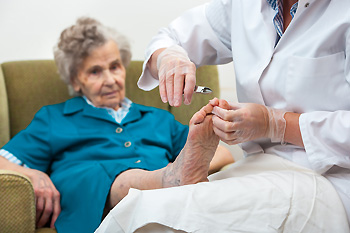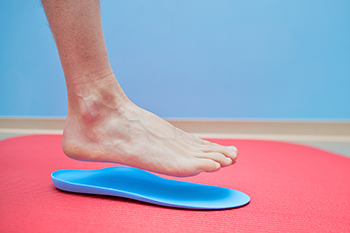Items filtered by date: October 2022
Heel Pain Causes and Possible Remedies

There are many people worldwide who have heel pain. It can happen for a variety of reasons, and prompt medical treatment may bring relief. A heel spur is known to be painful, and occurs as a result of calcium deposits that build up on the bottom of the heel. In severe cases, this is often removed surgically. Plantar fasciitis is a common heel injury and happens when the band of tissue that is on the sole of the foot becomes inflamed. This is known as the plantar fascia, and it connects the heel to the toes. Plantar fasciitis can happen from wearing shoes that do not have adequate support, and from standing on hard surfaces for most of the day. Heel pain may also happen from a foot injury, such as landing awkwardly on the heel. Relief may be felt when the affected foot is elevated, and this may relieve a portion of the swelling that can accompany heel pain. Many patients find it helpful to perform specific heel stretches, including standing on a step, and lowering one heel at a time until a gentle stretch is felt. Heel pain is effectively treated by a podiatrist, and it is strongly advised that you contact this type of doctor who can diagnose the cause, and offer you the correct treatment techniques.
Many people suffer from bouts of heel pain. For more information, contact Dr. Ronald Sheppard of Warren-Watchung Podiatry Center. Our doctor can provide the care you need to keep you pain-free and on your feet.
Causes of Heel Pain
Heel pain is often associated with plantar fasciitis. The plantar fascia is a band of tissues that extends along the bottom of the foot. A rip or tear in this ligament can cause inflammation of the tissue.
Achilles tendonitis is another cause of heel pain. Inflammation of the Achilles tendon will cause pain from fractures and muscle tearing. Lack of flexibility is also another symptom.
Heel spurs are another cause of pain. When the tissues of the plantar fascia undergo a great deal of stress, it can lead to ligament separation from the heel bone, causing heel spurs.
Why Might Heel Pain Occur?
- Wearing ill-fitting shoes
- Wearing non-supportive shoes
- Weight change
- Excessive running
Treatments
Heel pain should be treated as soon as possible for immediate results. Keeping your feet in a stress-free environment will help. If you suffer from Achilles tendonitis or plantar fasciitis, applying ice will reduce the swelling. Stretching before an exercise like running will help the muscles. Using all these tips will help make heel pain a condition of the past.
If you have any questions please contact one of our offices located in Marlboro and Watchung, NJ . We offer the newest diagnostic and treatment technologies for all your foot and ankle needs.
Heel Pain Causes and Possible Remedies

There are many people worldwide who have heel pain. It can happen for a variety of reasons, and prompt medical treatment may bring relief. A heel spur is known to be painful, and occurs as a result of calcium deposits that build up on the bottom of the heel. In severe cases, this is often removed surgically. Plantar fasciitis is a common heel injury and happens when the band of tissue that is on the sole of the foot becomes inflamed. This is known as the plantar fascia, and it connects the heel to the toes. Plantar fasciitis can happen from wearing shoes that do not have adequate support, and from standing on hard surfaces for most of the day. Heel pain may also happen from a foot injury, such as landing awkwardly on the heel. Relief may be felt when the affected foot is elevated, and this may relieve a portion of the swelling that can accompany heel pain. Many patients find it helpful to perform specific heel stretches, including standing on a step, and lowering one heel at a time until a gentle stretch is felt. Heel pain is effectively treated by a podiatrist, and it is strongly advised that you contact this type of doctor who can diagnose the cause, and offer you the correct treatment techniques.
Many people suffer from bouts of heel pain. For more information, contact Dr. Ronald Sheppard of Warren-Watchung Podiatry Center. Our doctor can provide the care you need to keep you pain-free and on your feet.
Causes of Heel Pain
Heel pain is often associated with plantar fasciitis. The plantar fascia is a band of tissues that extends along the bottom of the foot. A rip or tear in this ligament can cause inflammation of the tissue.
Achilles tendonitis is another cause of heel pain. Inflammation of the Achilles tendon will cause pain from fractures and muscle tearing. Lack of flexibility is also another symptom.
Heel spurs are another cause of pain. When the tissues of the plantar fascia undergo a great deal of stress, it can lead to ligament separation from the heel bone, causing heel spurs.
Why Might Heel Pain Occur?
- Wearing ill-fitting shoes
- Wearing non-supportive shoes
- Weight change
- Excessive running
Treatments
Heel pain should be treated as soon as possible for immediate results. Keeping your feet in a stress-free environment will help. If you suffer from Achilles tendonitis or plantar fasciitis, applying ice will reduce the swelling. Stretching before an exercise like running will help the muscles. Using all these tips will help make heel pain a condition of the past.
If you have any questions please contact one of our offices located in Marlboro and Watchung, NJ . We offer the newest diagnostic and treatment technologies for all your foot and ankle needs.
Gout Pain Can Be Managed
Gout Pain Can Be Managed
What Is Sweaty Sock Syndrome?

Helping your child maintain healthy feet is a critical step in enabling the child to grow into a strong and vibrant adult. One foot condition that can potentially compromise this goal is known as sweaty sock syndrome. This foot condition primarily affects children, particularly boys between the ages of 4 and 8. Sweaty sock syndrome can make an individual exhibit a red, scaly rash on the bottoms, or soles, of the feet. Specifically, the heel and big toe are areas of the sole that can be affected. Interestingly, some children with this condition may say that they feel as though their feet are sweating. However, the rash tends to feel dry. In some cases, the affected area may develop cracks, or fissures, in the skin. If you believe that your child may have this condition, it is best to contact a podiatrist to examine your child’s feet, particularly if they have fissures. Schedule an appointment with a podiatrist today.
Making sure that your children maintain good foot health is very important as they grow. If you have any questions, contact Dr. Ronald Sheppard of Warren-Watchung Podiatry Center. Our doctor can provide the care you need to keep you pain-free and on your feet.
Keeping Children's Feet Healthy
Having healthy feet during childhood can help prevent medical problems later in life, namely in the back and legs. As children grow, their feet require different types of care. Here are some things to consider...
Although babies do not walk yet, it is still very important to take care of their feet.
Avoid putting tight shoes or socks on his or her feet.
Allow the baby to stretch and kick his or her feet to feel comfortable.
As a toddler, kids are now on the move and begin to develop differently. At this age, toddlers are getting a feel for walking, so don’t be alarmed if your toddler is unsteady or ‘walks funny’.
As your child gets older, it is important to teach them how to take care of their feet.
Show them proper hygiene to prevent infections such as fungus.
Be watchful for any pain or injury.
Have all injuries checked by a doctor as soon as possible.
Comfortable, protective shoes should always be worn, especially at play.
If you have any questions please feel free to contact one of our offices located in Marlboro and Watchung, NJ . We offer the newest diagnostic and treatment technologies for all your foot and ankle needs.
What Is Sweaty Sock Syndrome?

Helping your child maintain healthy feet is a critical step in enabling the child to grow into a strong and vibrant adult. One foot condition that can potentially compromise this goal is known as sweaty sock syndrome. This foot condition primarily affects children, particularly boys between the ages of 4 and 8. Sweaty sock syndrome can make an individual exhibit a red, scaly rash on the bottoms, or soles, of the feet. Specifically, the heel and big toe are areas of the sole that can be affected. Interestingly, some children with this condition may say that they feel as though their feet are sweating. However, the rash tends to feel dry. In some cases, the affected area may develop cracks, or fissures, in the skin. If you believe that your child may have this condition, it is best to contact a podiatrist to examine your child’s feet, particularly if they have fissures. Schedule an appointment with a podiatrist today.
Making sure that your children maintain good foot health is very important as they grow. If you have any questions, contact Dr. Ronald Sheppard of Warren-Watchung Podiatry Center. Our doctor can provide the care you need to keep you pain-free and on your feet.
Keeping Children's Feet Healthy
Having healthy feet during childhood can help prevent medical problems later in life, namely in the back and legs. As children grow, their feet require different types of care. Here are some things to consider...
Although babies do not walk yet, it is still very important to take care of their feet.
Avoid putting tight shoes or socks on his or her feet.
Allow the baby to stretch and kick his or her feet to feel comfortable.
As a toddler, kids are now on the move and begin to develop differently. At this age, toddlers are getting a feel for walking, so don’t be alarmed if your toddler is unsteady or ‘walks funny’.
As your child gets older, it is important to teach them how to take care of their feet.
Show them proper hygiene to prevent infections such as fungus.
Be watchful for any pain or injury.
Have all injuries checked by a doctor as soon as possible.
Comfortable, protective shoes should always be worn, especially at play.
If you have any questions please feel free to contact one of our offices located in Marlboro and Watchung, NJ . We offer the newest diagnostic and treatment technologies for all your foot and ankle needs.
Elderly Foot Care

Elderly foot care can help prevent injuries, falls, and complications from chronic diseases like diabetes. Since muscle tissue on the feet can thin and nerves work less effectively with age, one might not feel if they have cuts, blisters, or sores on their feet. Daily examination of the feet with a mirror is therefore important. Wear well-fitting shoes that provide stability. When going outdoors, wear closed-toe shoes to protect your feet and prevent cuts and scrapes. Keep toenails trimmed by cutting them straight across and not too short to avoid ingrown toenails. To promote good circulation, stop smoking if you smoke, stretch your feet each day, prop them up on a stool or couch when sitting, and wiggle your toes when sitting for long periods. Wash your feet daily, dry them well, and apply a moisturizer. Change socks regularly to prevent fungal infections. If you are a senior and have a problem with your feet or just want to ensure your feet remain in good shape, visit a podiatrist regularly for foot checks.
Proper foot care is something many older adults forget to consider. If you have any concerns about your feet and ankles, contact Dr. Ronald Sheppard from Warren-Watchung Podiatry Center. Our doctor can provide the care you need to keep you pain-free and on your feet.
The Elderly and Their Feet
As we age we start to notice many changes in our body, but the elder population may not notice them right away. Medical conditions may prevent the elderly to take notice of their foot health right away. Poor vision is a lead contributor to not taking action for the elderly.
Common Conditions
- Neuropathy – can reduce feeling in the feet and can hide many life-threatening medical conditions.
- Reduced flexibility – prevents the ability of proper toenail trimming, and foot cleaning. If left untreated, it may lead to further medical issues.
- Foot sores – amongst the older population can be serious before they are discovered. Some of the problematic conditions they may face are:
- Gouging toenails affecting nearby toe
- Shoes that don’t fit properly
- Pressure sores
- Loss of circulation in legs & feet
- Edema & swelling of feet and ankles
Susceptible Infections
Diabetes and poor circulation can cause general loss of sensitivity over the years, turning a simple cut into a serious issue.
If you have any questions please feel free to contact one of our offices located in Marlboro and Watchung, NJ . We offer the newest diagnostic and treatment technologies for all your foot and ankle needs.
Elderly Foot Care

Elderly foot care can help prevent injuries, falls, and complications from chronic diseases like diabetes. Since muscle tissue on the feet can thin and nerves work less effectively with age, one might not feel if they have cuts, blisters, or sores on their feet. Daily examination of the feet with a mirror is therefore important. Wear well-fitting shoes that provide stability. When going outdoors, wear closed-toe shoes to protect your feet and prevent cuts and scrapes. Keep toenails trimmed by cutting them straight across and not too short to avoid ingrown toenails. To promote good circulation, stop smoking if you smoke, stretch your feet each day, prop them up on a stool or couch when sitting, and wiggle your toes when sitting for long periods. Wash your feet daily, dry them well, and apply a moisturizer. Change socks regularly to prevent fungal infections. If you are a senior and have a problem with your feet or just want to ensure your feet remain in good shape, visit a podiatrist regularly for foot checks.
Proper foot care is something many older adults forget to consider. If you have any concerns about your feet and ankles, contact Dr. Ronald Sheppard from Warren-Watchung Podiatry Center. Our doctor can provide the care you need to keep you pain-free and on your feet.
The Elderly and Their Feet
As we age we start to notice many changes in our body, but the elder population may not notice them right away. Medical conditions may prevent the elderly to take notice of their foot health right away. Poor vision is a lead contributor to not taking action for the elderly.
Common Conditions
- Neuropathy – can reduce feeling in the feet and can hide many life-threatening medical conditions.
- Reduced flexibility – prevents the ability of proper toenail trimming, and foot cleaning. If left untreated, it may lead to further medical issues.
- Foot sores – amongst the older population can be serious before they are discovered. Some of the problematic conditions they may face are:
- Gouging toenails affecting nearby toe
- Shoes that don’t fit properly
- Pressure sores
- Loss of circulation in legs & feet
- Edema & swelling of feet and ankles
Susceptible Infections
Diabetes and poor circulation can cause general loss of sensitivity over the years, turning a simple cut into a serious issue.
If you have any questions please feel free to contact one of our offices located in Marlboro and Watchung, NJ . We offer the newest diagnostic and treatment technologies for all your foot and ankle needs.
Two Categories of Orthotics

Orthotics are insoles that fit into the shoe. Custom-made orthotics are specifically designed to the individual patient and foot condition and can be a successful method in reducing or eliminating foot pain. Wearing orthotics may help to restore ankle function, in addition to correcting foot deformities, such as flat feet. Many patients who have bunions, hammertoes, arthritis, or diabetes may benefit from wearing orthotics as part of their treatment plan. There are two types of orthotics, rigid and accommodative. The latter type is flexible and cushioned, while plastic materials are used to construct rigid orthotics. The process of having custom-made orthotics begins by having a mold made of the patient’s feet, while considering their footwear needs. If you have a foot condition that may be helped by wearing orthotics, please contact a podiatrist who can determine if this is the best decision for you.
If you are having discomfort in your feet and would like to try orthotics, contact Dr. Ronald Sheppard from Warren-Watchung Podiatry Center. Our doctor can provide the care you need to keep you pain-free and on your feet.
What Are Orthotics?
Orthotics are inserts you can place into your shoes to help with a variety of foot problems such as flat feet or foot pain. Orthotics provide relief and comfort for minor foot and heel pain but can’t correct serious biomechanical problems in your feet.
Over-the-Counter Inserts
Orthotics come in a wide variety of over-the-counter inserts that are used to treat foot pain, heel pain, and minor problems. For example, arch supports can be inserted into your shoes to help correct overarched or flat feet, while gel insoles are often used because they provide comfort and relief from foot and heel pain by alleviating pressure.
Prescription Orthotics
If over-the-counter inserts don’t work for you or if you have a more severe foot concern, it is possible to have your podiatrist prescribe custom orthotics. These high-quality inserts are designed to treat problems such as abnormal motion, plantar fasciitis, and severe forms of heel pain. They can even be used to help patients suffering from diabetes by treating foot ulcers and painful calluses and are usually molded to your feet individually, which allows them to provide full support and comfort.
If you are experiencing minor to severe foot or heel pain, it’s recommended to speak with your podiatrist about the possibilities of using orthotics. A podiatrist can determine which type of orthotic is right for you and allow you to take the first steps towards being pain-free.
If you have any questions please contact one of our offices located in Marlboro and Watchung, NJ . We offer the newest diagnostic and treatment technologies for all your foot and ankle needs.

